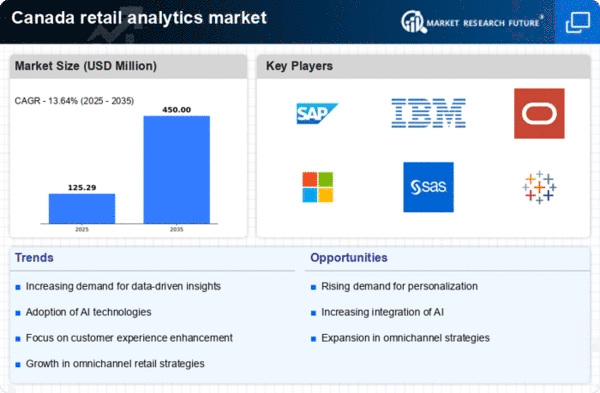Integration of Advanced Technologies
The integration of advanced technologies, such as the Internet of Things (IoT) and big data analytics, is reshaping the retail analytics market in Canada. Retailers are increasingly leveraging IoT devices to gather real-time data on consumer interactions and preferences. This influx of data enables more precise analytics, allowing retailers to tailor their offerings and marketing strategies. Furthermore, the combination of big data analytics with traditional retail practices enhances operational efficiency and customer engagement. As these technologies continue to evolve, the retail analytics market is expected to grow, driven by the need for retailers to harness data effectively and create personalized shopping experiences.
Rise of E-commerce and Online Shopping
The retail analytics market in Canada is significantly influenced by the rise of e-commerce and online shopping. With a reported increase of over 30% in online retail sales in recent years, retailers are compelled to adopt analytics solutions to track and analyze consumer behavior in digital environments. This shift necessitates a deeper understanding of online customer journeys, conversion rates, and product performance. Retailers are increasingly utilizing analytics to optimize their online presence, enhance user experience, and tailor marketing efforts. As e-commerce continues to expand, the retail analytics market is likely to see sustained growth, driven by the need for data-driven strategies that cater to the evolving preferences of Canadian consumers.
Growing Demand for Data-Driven Insights
The retail analytics market in Canada experiences a notable surge in demand for data-driven insights. Retailers increasingly recognize the value of leveraging analytics to enhance decision-making processes. According to recent statistics, approximately 70% of Canadian retailers are investing in analytics tools to better understand consumer behavior and preferences. This trend indicates a shift towards a more analytical approach, where data informs inventory management, pricing strategies, and marketing campaigns. As retailers seek to optimize operations and improve customer satisfaction, the retail analytics market is poised for growth. The ability to derive actionable insights from vast amounts of data is becoming essential for maintaining a competitive edge in the retail landscape.
Emphasis on Inventory Management Efficiency
Efficient inventory management is a critical driver for the retail analytics market in Canada. Retailers are increasingly adopting analytics tools to optimize stock levels, reduce excess inventory, and minimize stockouts. Recent data suggests that retailers utilizing advanced analytics can reduce inventory costs by up to 25%. This focus on efficiency not only enhances profitability but also improves customer satisfaction by ensuring product availability. As competition intensifies, the ability to manage inventory effectively through data insights becomes paramount. Consequently, the retail analytics market is likely to expand as retailers seek innovative solutions to streamline their inventory processes and respond swiftly to market demands.
Focus on Regulatory Compliance and Data Security
In the context of the retail analytics market in Canada, the focus on regulatory compliance and data security is becoming increasingly prominent. Retailers are required to adhere to stringent data protection regulations, which necessitates the implementation of robust analytics solutions that ensure compliance. This focus on security not only protects consumer data but also builds trust and loyalty among customers. As retailers invest in secure analytics platforms, the market is likely to witness growth, driven by the need for solutions that balance data utilization with compliance requirements. The emphasis on data security is expected to shape the future of the retail analytics market, as retailers navigate the complexities of regulatory landscapes.
















